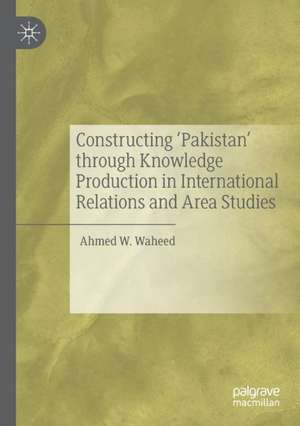Constructing 'Pakistan' through Knowledge Production in International Relations and Area Studies
Autor Ahmed W. Waheeden Limba Engleză Paperback – 18 noi 2020
| Toate formatele și edițiile | Preț | Express |
|---|---|---|
| Paperback (1) | 580.82 lei 6-8 săpt. | |
| Springer Nature Singapore – 18 noi 2020 | 580.82 lei 6-8 săpt. | |
| Hardback (1) | 585.08 lei 6-8 săpt. | |
| Springer Nature Singapore – 18 noi 2019 | 585.08 lei 6-8 săpt. |
Preț: 580.82 lei
Preț vechi: 683.32 lei
-15% Nou
Puncte Express: 871
Preț estimativ în valută:
111.15€ • 115.62$ • 91.76£
111.15€ • 115.62$ • 91.76£
Carte tipărită la comandă
Livrare economică 15-29 aprilie
Preluare comenzi: 021 569.72.76
Specificații
ISBN-13: 9789811507441
ISBN-10: 9811507449
Pagini: 230
Ilustrații: XVII, 230 p. 1 illus.
Dimensiuni: 148 x 210 mm
Greutate: 0.33 kg
Ediția:1st ed. 2020
Editura: Springer Nature Singapore
Colecția Palgrave Macmillan
Locul publicării:Singapore, Singapore
ISBN-10: 9811507449
Pagini: 230
Ilustrații: XVII, 230 p. 1 illus.
Dimensiuni: 148 x 210 mm
Greutate: 0.33 kg
Ediția:1st ed. 2020
Editura: Springer Nature Singapore
Colecția Palgrave Macmillan
Locul publicării:Singapore, Singapore
Cuprins
1. Introduction.- 2. The ‘Truth’ about Pakistan: Knowledge Production and Circulation in International Relations.- 3. The ‘Truth’ about Pakistan: Knowledge Production and Circulation in Area Studies.- 4. The ‘Truth about Pakistan: Knowledge Production and Circulation in Think Tanks.- 5. Knowledge Production and Circulation in Pakistani International Relations.- 6. Conclusion.
Notă biografică
Ahmed W. Waheed is an Assistant Professor at the Center for International Peace and Stability, National University of Sciences and Technology, Islamabad, Pakistan. He is the author of The Wrong Ally: Pakistan’s State Sovereignty under US Dependence (2018).
Textul de pe ultima copertă
This book analyses the discourse on Pakistan by exploring the knowledge production processes through which the International Relations community, Asian and South Asian area study centres, and think-tanks construct Pakistan’s identity. This book does not attempt to trace how Pakistan has been historically defined, explained, or understood by the International Relations interpretive communities or to supplant these understandings with the author’s version of what Pakistan is. Instead, this study focuses on investigating how the identity of Pakistan is fixed or stabilized via practices of the interpretive communities. In other words, this book attempts to address the following questions: How is the knowledge on Pakistan produced discursively? How is this knowledge represented in the writings on Pakistan? What are the conditions under which it is possible to make authoritative claims about Pakistan?
Ahmed W. Waheed is an Assistant Professor at the Center for International Peace and Stability, National University of Sciences and Technology, Islamabad, Pakistan. He is the author of The Wrong Ally: Pakistan’s State Sovereignty under US Dependence (2018).
Caracteristici
Examines how Pakistan’s identity is constructed within the wider International Relations (IR) discipline Analyzes the IR discourse by including 'Area Studies' and Think-tanks as part of the wider IR Community Analyses production of representational identity based in on Jennifer Milliken’s methodology on productivity of discourse Challenges basic assumptions on Pakistan, not the facts they know, but the ways in which they have obtained knowledge
